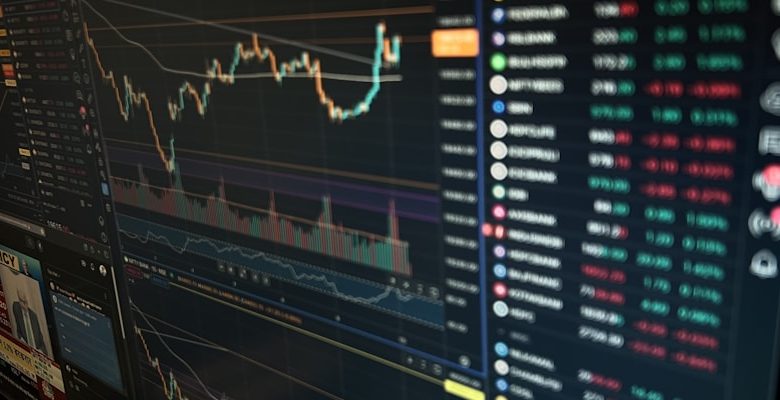The Impact of Market Volatility on Crypto Trading

- The Relationship Between Market Volatility and Crypto Trading
- How Market Volatility Affects Crypto Traders
- Strategies for Navigating Market Volatility in Crypto Trading
- The Psychological Impact of Market Volatility on Crypto Investors
- Analyzing the Historical Trends of Market Volatility in Crypto Trading
- The Role of Regulation in Mitigating Market Volatility in Crypto Trading
The Relationship Between Market Volatility and Crypto Trading
Market volatility has a significant impact on crypto trading, as the prices of cryptocurrencies can fluctuate dramatically in response to market conditions. Traders in the crypto market must be prepared to navigate these fluctuations and adjust their strategies accordingly to mitigate risks and capitalize on opportunities.
Volatility in the market can create both challenges and opportunities for crypto traders. On one hand, sudden price swings can lead to significant losses if traders are not careful. On the other hand, volatility can also create opportunities for traders to profit from price movements by making well-timed trades.
Understanding the relationship between market volatility and crypto trading is crucial for traders looking to succeed in this fast-paced and dynamic market. By staying informed about market trends and developments, traders can make more informed decisions and better navigate the ups and downs of the market.
How Market Volatility Affects Crypto Traders
When it comes to crypto trading, market volatility plays a significant role in influencing traders’ decisions and outcomes. The constant fluctuations in prices can lead to both opportunities and risks for those involved in the cryptocurrency market.
One of the ways market volatility affects crypto traders is by increasing the level of uncertainty in the market. Sudden price swings can make it challenging for traders to predict the direction in which the market will move, making it harder for them to make informed decisions.
Moreover, market volatility can also lead to higher levels of stress and anxiety among traders. The fear of losing money or missing out on potential profits can take a toll on traders’ mental health, leading to emotional decision-making that may not always be rational.
On the flip side, market volatility can also present opportunities for traders to capitalize on price movements and generate profits. For those who are able to navigate the market effectively, volatility can be a source of potential gains.
Overall, it is essential for crypto traders to understand how market volatility can impact their trading strategies and to develop risk management techniques to mitigate the effects of sudden price fluctuations. By staying informed and being prepared for market volatility, traders can position themselves for success in the ever-changing world of cryptocurrency trading.
Strategies for Navigating Market Volatility in Crypto Trading
When facing market volatility in crypto trading, it is essential to have strategies in place to navigate through uncertain times. Here are some tips to help you manage your trades effectively:
- Diversify your portfolio: By spreading your investments across different cryptocurrencies, you can reduce the impact of volatility on your overall trading performance.
- Set stop-loss orders: Setting stop-loss orders can help protect your investments by automatically selling your assets if they reach a certain price point.
- Stay informed: Stay up to date with the latest news and developments in the crypto market to make informed trading decisions.
- Use technical analysis: Utilize technical analysis tools to identify trends and patterns in the market, helping you make better predictions about price movements.
- Practice risk management: Only invest what you can afford to lose and avoid making impulsive decisions based on emotions.
By following these strategies, you can better navigate market volatility in crypto trading and increase your chances of success in this dynamic and unpredictable market.
The Psychological Impact of Market Volatility on Crypto Investors
The psychological impact of market volatility on crypto investors can be significant, leading to increased levels of stress, anxiety, and uncertainty. When prices are constantly fluctuating, investors may experience fear of missing out (FOMO) when prices rise and fear of losing money when prices fall.
This rollercoaster of emotions can take a toll on investors’ mental well-being, causing them to make impulsive decisions that they may later regret. The fear and uncertainty associated with market volatility can also lead to sleepless nights and difficulty focusing on other aspects of life.
It is essential for crypto investors to be aware of the psychological impact of market volatility and to develop strategies to cope with these challenges. This may include setting clear investment goals, diversifying their portfolio, and seeking support from a financial advisor or mental health professional.
Analyzing the Historical Trends of Market Volatility in Crypto Trading
When analyzing the historical trends of market volatility in crypto trading, it is evident that the cryptocurrency market is known for its high levels of fluctuation. This volatility can be attributed to various factors such as market demand, regulatory developments, and investor sentiment.
One of the key reasons behind the volatility in crypto trading is the lack of regulation in the market. This absence of oversight can lead to sudden price swings as investors react to news and events in an unregulated environment.
Moreover, the speculative nature of cryptocurrencies also contributes to market volatility. Traders often make decisions based on speculation rather than fundamental analysis, leading to rapid price changes in the market.
Additionally, external factors such as global economic events and geopolitical tensions can also impact the volatility of crypto trading. For example, regulatory crackdowns in certain countries can lead to a sharp decline in prices, while positive news can result in a sudden surge in value.
Overall, understanding the historical trends of market volatility in crypto trading is essential for investors to make informed decisions and manage their risk exposure effectively in this highly unpredictable market.
The Role of Regulation in Mitigating Market Volatility in Crypto Trading
The regulation plays a critical role in mitigating the extreme fluctuations in the cryptocurrency market. By implementing rules and guidelines, regulators aim to create a more stable environment for crypto trading. These regulations help prevent market manipulation, fraud, and other illicit activities that can contribute to volatility. Additionally, regulatory oversight can increase investor confidence and attract more institutional players to the market, further stabilizing prices.
One way in which regulations help reduce market volatility is by imposing restrictions on leverage and margin trading. These practices can amplify price swings and lead to sudden market crashes. By setting limits on leverage ratios and margin requirements, regulators can prevent excessive speculation and reduce the likelihood of large-scale sell-offs. This, in turn, can help stabilize prices and make the market less prone to extreme fluctuations.
Furthermore, regulatory frameworks can address issues such as insider trading, market abuse, and money laundering, which can all contribute to market volatility. By enforcing strict rules and conducting thorough investigations, regulators can deter bad actors from engaging in illegal activities that could disrupt the market. This creates a more level playing field for all participants and fosters a healthier trading environment.
In conclusion, regulation plays a crucial role in mitigating market volatility in crypto trading. By setting clear rules, monitoring compliance, and enforcing penalties for violations, regulators can help create a more stable and secure market for investors. While some may argue that excessive regulation can stifle innovation and growth, a balanced approach that protects investors while allowing for market development is essential for the long-term sustainability of the cryptocurrency market.



